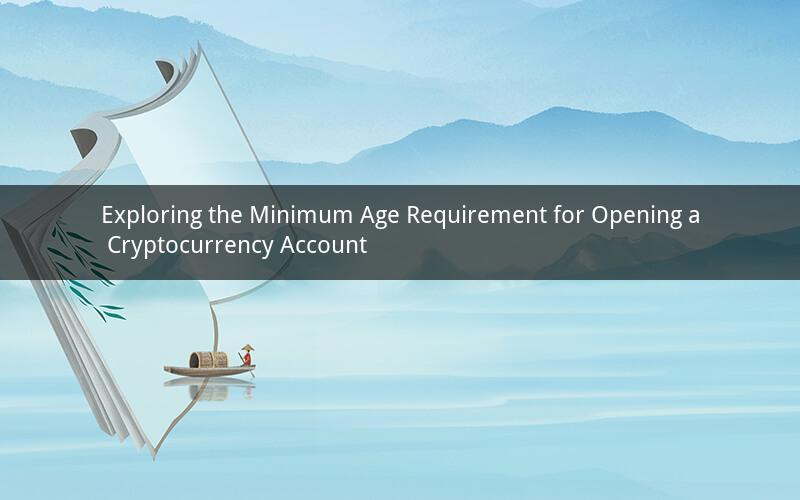
Introduction:
In the rapidly evolving world of cryptocurrencies, many individuals are eager to join the digital revolution. However, one crucial question that often arises is: how old do you have to be to open a cryptocurrency account? This article delves into the minimum age requirements for opening a crypto account, the reasons behind these regulations, and the potential risks associated with early cryptocurrency investments.
Minimum Age Requirement:
The minimum age requirement for opening a cryptocurrency account varies depending on the platform and jurisdiction. Generally, most exchanges and wallets set the age limit at 18 years old. However, some platforms may have lower age requirements, often ranging from 16 to 18 years old, while others may have stricter regulations.
Reasons Behind Minimum Age Requirements:
1. Legal and Regulatory Compliance: Cryptocurrency platforms are subject to various laws and regulations, including anti-money laundering (AML) and know your customer (KYC) requirements. By setting a minimum age limit, these platforms can ensure that they comply with legal obligations and prevent potential misuse of their services.
2. Financial Responsibility: Cryptocurrencies can be highly volatile, and investing in them requires a certain level of financial knowledge and responsibility. By limiting access to individuals of a certain age, platforms can help protect young investors from making impulsive decisions that could lead to significant financial losses.
3. Parental Consent: In some cases, platforms may require parental consent for minors to open a cryptocurrency account. This ensures that parents are aware of their child's activities and can provide guidance and support.
Risks Associated with Early Cryptocurrency Investments:
1. Financial Risk: Cryptocurrencies are known for their high volatility, which can lead to significant gains or losses in a short period. Young investors may not have the experience or emotional resilience to handle such fluctuations, potentially resulting in substantial financial losses.
2. Regulatory Risk: The cryptocurrency market is still relatively new and evolving, with regulations constantly changing. Early investors may face unexpected regulatory challenges that could impact their investments.
3. Security Risk: The cryptocurrency market is not immune to hacking and theft. Young investors may not have the necessary knowledge or precautions to protect their assets, making them more susceptible to cyber threats.
Questions and Answers:
Q1: Can minors open a cryptocurrency account without parental consent?
A1: It depends on the platform's policies. While some platforms may allow minors to open an account with parental consent, others may have stricter regulations and require the minor to be of legal age.
Q2: Are there any age restrictions for using a cryptocurrency wallet?
A2: Most cryptocurrency wallets do not have age restrictions, allowing users of all ages to create and manage their wallets. However, some wallets may have specific policies regarding the use of their services.
Q3: Can a minor inherit cryptocurrency assets?
A3: Yes, a minor can inherit cryptocurrency assets. However, the legal process for accessing and managing these assets may vary depending on the jurisdiction and the platform's policies.
Q4: Are there any educational resources available for young cryptocurrency investors?
A4: Yes, there are numerous educational resources available, including online courses, books, and forums, that can help young investors gain a better understanding of cryptocurrencies and make informed investment decisions.
Q5: Can a minor use a cryptocurrency exchange to trade cryptocurrencies?
A5: It is highly unlikely for a minor to use a cryptocurrency exchange to trade cryptocurrencies due to the age restrictions and legal requirements. However, minors may be able to open a trading account with parental consent and guidance.
Conclusion:
Understanding the minimum age requirement for opening a cryptocurrency account is crucial for individuals of all ages. By adhering to these regulations, platforms can ensure compliance with legal obligations, protect young investors from potential risks, and promote responsible cryptocurrency usage. It is essential for individuals to research and choose platforms that align with their age and experience level to make informed decisions in the world of cryptocurrencies.